Where: The Oleg Tabakov Theatre
What: Konstantin Bogomolov’s production of The Seagull by Anton Chekhov
Stage Design: Larisa Lomakina
Premiere: 08 March 2014
There are four tiers of long benches on the stage that serve as a prolongation of the seating area of the house. Three steps separate the stage from the house, three more steps make the divide between the scenic area of an amateur theatre (the onstage stage) and the real one, that of the Moscow Art Theatre. The backdrop now and then turns into a screen. On this screen laconic supertitles flash occasionally in the manner of “Summer. Evening. The Sorins’ estate. Amateur summer theatre.” Everything is exactly like Treplev wanted it – “no scenery” and an “empty space” — though not at all devoid of meaning.
Camera, screen, supertitles — all these have long become the trademark of Russian director Konstantin Bogomolov’s productions. Yet, for each production, this set of additional expressive means is reshuffled, presenting a new combination of elements. This time the screen is placed not by the stage, or over it, but behind the actors. On the half-empty stage, with a scenic design that, in the first act, involves nothing but bleak, stained walls, a platform, and some benches, actors become the focus of attention. The screen does not distract, it just snatches some close-ups for the spectators in the back rows, and plays with the perception of the spectators in the front rows. The initial scenes resist all the unwritten theatrical laws with the actors playing with their backs to the audience. Thus, the director effortlessly destroys (and construes) one of theatre’s most practised conventions, thereby showing that theatre need not necessarily be frontal. Many things when seen “from the rear,” with the backside viewed foremost, allow for a better, more accurate understanding than frontality will ever offer. The screen that performs the role of the lake – the magic lake – reflects the characters like a smooth-surfaced yet murky body of water. The screen also contributes to creating the intimate mood of a family drama on public display. It narrows the space, focusing the audience’s attention on this or that face at different angles. It would be an incomplete experience to watch this production of The Seagull while ignoring the screen as then, one’s very perception would be flawed.
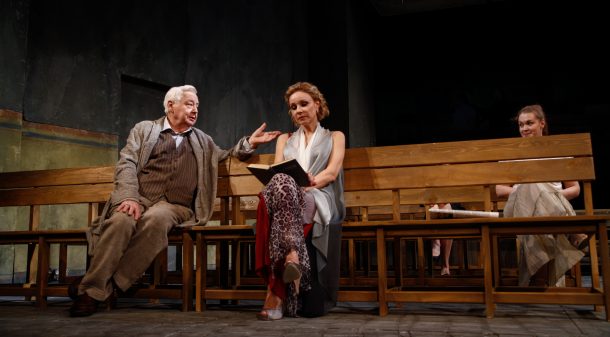
A scene from The Seagull, directed by Konstantin Bogomolov at the Oleg Tabakov Theatre, Moscow, 2014. Photo: The Oleg Tabakov Theatre.
The last row of the benches, as often happens in the summer or in movie theaters, are the seats designated for kissing. It is there that Masha (Darya Moroz) and Medvedenko (Danila Steklov) are waiting for the performance of Konstantin Treplev’s play to begin amid dust, desolation and the debris of the Sorins’ estate. Masha tries to brush the specks of this debris off her black dress. Masha wears black because she is, as she insists, “in mourning for my life.” The dress becomes her. It becomes the production too, which is somewhat mournful in tone; it is in a minor key. Desperately in love, and in despair because her love is rejected, she stages her own little “performance”. And hearing the voices of Treplev (Igor Khripunov) and Sorin (Sergei Sosnovskiy) approaching, she deliberately kisses Medvedenko.
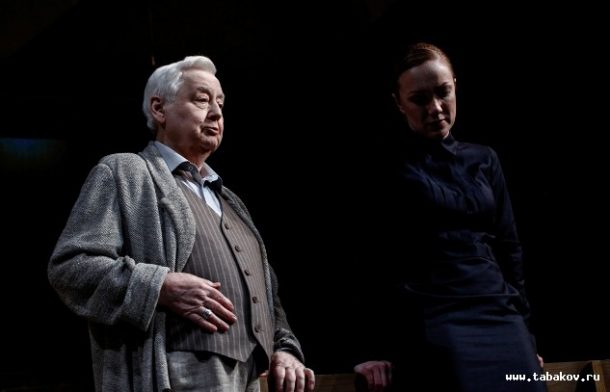
A scene from The Seagull, directed by Konstantin Bogomolov at the Oleg Tabakov Theatre, Moscow, 2014. Photo: The Oleg Tabakov Theatre.
“Sky glowing red. The moon begins to rise,” Nina Zarechnaya (Svetlana Kolpakova) reads aloud the supertitles that flash upon the screen, and ascends the stage. She is a strapping, ruddy, vigorous, robust country girl — “just like this idiotic moon in these here idiotic skies.” Another supertitle, in black on white, informs us: “Tree,” as if to remind the audience that “there’s hardly any action” in the play, “only the reading stuff.” The audience reads. The audience laughs, talks. And the performers on stage are also talking, just like the people in the audience, without any theatrical gesticulation in quiet, low voices (the mics in the proscenium and over the stage allow this). They talk like people, not actors, but without abstaining from carefully employed speech training techniques.
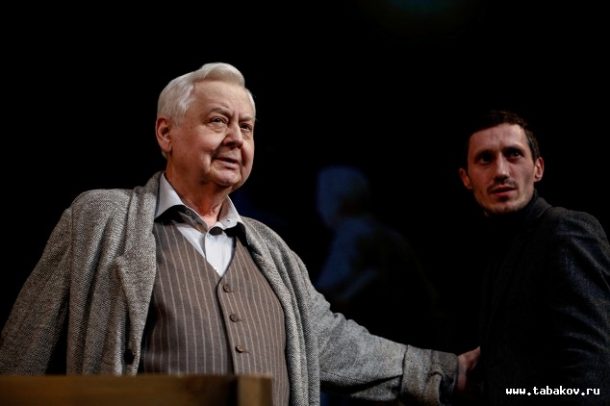
A scene from The Seagull, directed by Konstantin Bogomolov at the Oleg Tabakov Theatre, Moscow, 2014. Photo: The Oleg Tabakov Theatre.
Meanwhile, in the onstage seating area, the public begins to assemble, and eventually she enters who cannot and will not be “a member of the audience” – Arcadina (Marina Zudina). The performance will start before Zarechnaya even mounts the stage. Arcadina will act and recite, and in order to answer her, her son will have to mount the stage himself, which is the only way to draw her attention. Her very name is breaking news for the newspapers, and he is only a Treplev, a Mr Breakers. Till he takes to arms, nobody takes notice of him. Failing to come up with the right words, he descends from the platform, and eventually flees from the Moscow Art Theatre stage into the house, after his first night comes to such an abrupt and premature end and becomes a disastrous failure.
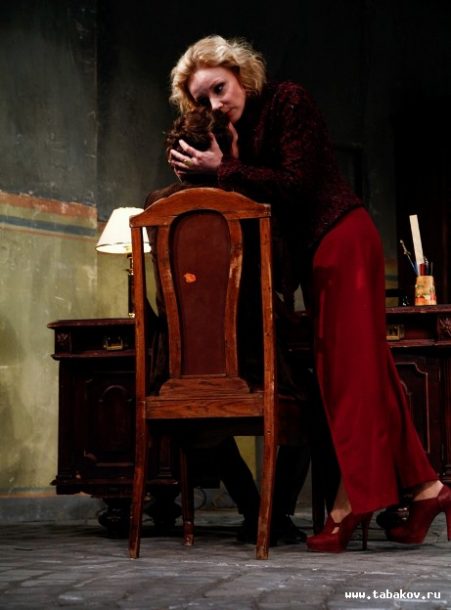
Arcadina in The Seagull, directed by Konstantin Bogomolov at the Oleg Tabakov Theatre, Moscow, 2014. Photo: The Oleg Tabakov Theatre.
Nina Zarechnaya is on the platform, like a child put on a chair. She recites a well-learnt yet to her, incomprehensible — text about people and partridges clearly, confidently and sincerely, and those in the “seating area for the audience” do not stay idle either. Treplev, as the director, gestures to her indicating what she should do with her hands, and prompts her to speak faster; Arcadina comments and acts, even offstage; suffering from boredom, Trigorin (Igor Mirkurbanov) looks at the floor, at the ceiling, and at his watch; and Dorn (Oleg Tabakov) is repeatedly distracted by the jealous Polina Andreevna (Olga Barnet). Later, after the untimely termination of the performance, somebody sings on the other side of the lake, and on this side the characters remain bored and continue talking. They talk of not even the failure of the play, but about their own concerns to one another while not listening to the person on the other end of the conversation. And so it goes on for the whole duration of the performance. Those who have nothing and nobody of their own, listen to those whom they would like to call their own – Masha listens to Treplev while Zarechnaya listens to Trigorin. And others look after “their own” with Arcadina looking after Trigorin, Polina Andreevna after Dorn, and Shamrayev (Pavel Ilyin) after Polina Andreevna. But Arcadina will fail to look sharply enough…
The surtitles inform us that it is “Three days later;” the benches are turned around to face the audience. In the first row, on two separate benches sit the writer and Zarechnaya whom Trigorin considers a potential “plot, the subject matter, or an idea for a short story.” The two are about to meet, get a better look at each other, and start an affair. Trigorin’s outfit is superb, consisting of a book, a pen, a cigarette-case and an ash-tray. He is gloomy, he is sulky, he “has had enough of all this.” He is a bit boorish. A burnt out man. A tired man. Tired of everybody and everything, and especially of talking. The girl, Nina, is quite near, so he must talk to her. Well, it might bring about some useful theme, or a plot, or a detail. She is waiting for his words, eager to hang on to his lips, and he also gradually starts snatching at both his own phrases and hers, at his own words and hers, because he must write. He used to want to write, and now he must. Their conversation starts out like an interview. Without enthusiasm, affecting a grand manner and faking a serious attitude, he tells her about himself, and his place and role in art. Sitting half turned towards her, hardly ever looking her way, he suddenly starts to notice how she is listening to him. It has been a long time since anybody has listened to him like that – with utter sincerity, in a good-natured way and without narrowing one’s eyes skeptically, or calculatingly. And something awakens, bursts out through the free and easy manner of a writer who has come to the country for some “ground work,” while enjoying basking in the sun. That free and easy manner was to test her, “Who are you, lady?” He sees through her all right- her worship, her illusions, her delight, her desire, not so much to be interesting, but enough to make him interested. And he sees himself in unadorned nakedness too – professionally exhausted from having done too much “express-travel” kind of writing, stripped of all the qualities he perceives now in her – she who is so naïve, so unaffected. And she becomes bolder, she moves closer to him. After introducing herself she held on to his hand for far too long (he was silent at that moment instead of talking himself, he felt as if he himself was being talked about). Now, she covers his hand with her own, then takes his hand and puts it on her knee. He is quite aware of it all, he understands everything perfectly well. And he is looking not into her shining eyes that become just a little bit sly in his presence, but at her body.
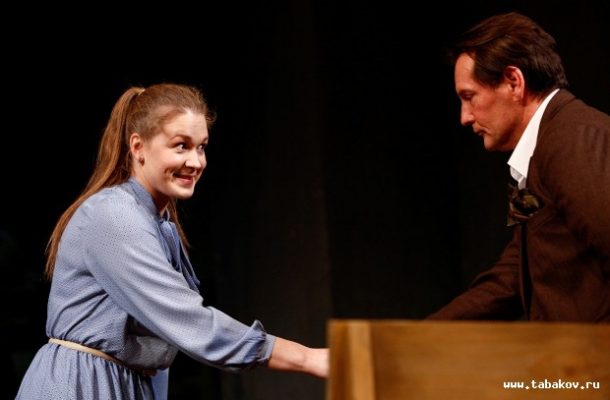
A scene from The Seagull, directed by Konstantin Bogomolov at the Oleg Tabakov Theatre, Moscow, 2014. Photo: The Oleg Tabakov Theatre.
Trigorin-Mirkurbanov is mostly silent, though profuse on paper. He does not bother to seduce Nina. Like the fish in that lake, she is eager to fall into his hands. No fishing tackle needed. Trigorin warns Zarechnaya, “I am false, false to the very core.” And she thinks he has been “working too hard,” and addresses him open-heartedly. And suddenly he starts to open his heart too, revealing what is most private and sacred. About his writing. About things that, not long before, the young struggling writer Treplev was talking about – “the same thing again and again” that sucks you in – that merry-go-round, those reiterations and the rumination that life turns into. “Masks of the carnival party going round and round” and originating from and affecting readers, fans and critics. It really captured Trigorin. He complains about not being able to write better than Turgenev, and about time dictating what he should write. Time’s dictation moves too fast. He is not up to that tempo, he falls behind in his writing “about the people, their sufferings, their future” (at this point Mirkurbanov raises his eyes heavenwards). The time of the landscape-painters has run out. Literature needs citizen Trigorin. “It’s OK, I am writing it right now, I am,” he nods, waves his hand reassuringly – he is doing what he must, “I am writing it, I am.” She kisses him, and he resumes writing, jotting everything down. Again, taking the landscape as his point of departure, he begins writing from that lake. Trigorin is not a seducer, but rather the one seduced, fallen for the tantalizing prospect of a new page, a new inspiration – attracted not so much by novelty (female fans belong to the bygone epoch that he is done with), as by the anticipation of newness. This Chekhovian “but suddenly” turn is what captivates him as it was something he had believed to have lost for good.
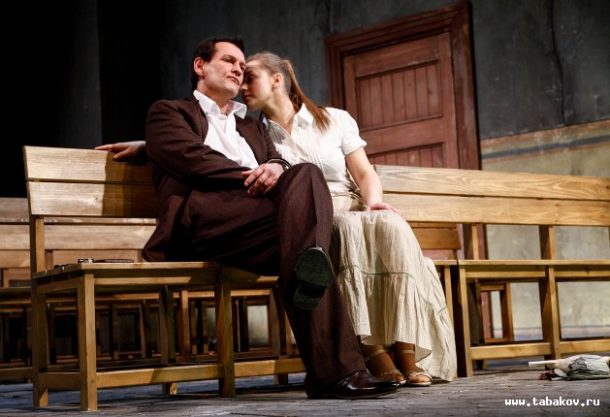
A scene from The Seagull, directed by Konstantin Bogomolov at the Oleg Tabakov Theatre, Moscow, 2014. Photo: The Oleg Tabakov Theatre.
“Am I an Agamemnon, or what?”, he will do no sacrificing himself, but he will accept a sacrifice made by another. Sacrifice comes from the will of those who make them. And he has “no will of his own.” Zarechnaya will make him the gift of her life, but he will accept only some lines from his book Days and Nights.
It is the day of the departure. The repetitious arpeggios of Faustas Latenas’s disquieting music count down the minutes of the last scene between Trigorin and Zarechnaya. Speaking from below, Nina addresses Trigorin from the seating area of the house. He is on the stage, on the pedestal. In her eyes he is the ideal — unlike Arcadina who has no illusions about Trigorin. Suddenly Trigorin’s on-screen voice takes the lead, expressing his thoughts, his doubts. The actor on the stage is standing still; he is silent against the background of words. He enacts his thoughts – he is on edge, he is deeply disturbed, his gestures are precise and accurate. Next to him is a very clever woman called Zudina — a good actress portraying Arcadina — who is paying him absurdly false compliments, treating him to the very saccharine praises he cannot stand, deliberately making her words false and flat, since she knows all too well he is sensitive to this. Arcadina’s words in praise of Trigorin — that gifted, clever Russia’s only hope — in this production, acquire exactly the opposite meaning. They make him smile. Bitterly. Arcadina reminds Trigorin of that timid beginner, that young writer full of hope and illusions that he once was – his younger self that he has since betrayed.
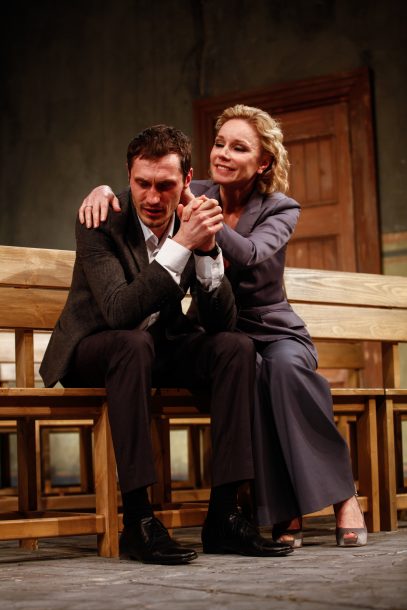
A scene from The Seagull, directed by Konstantin Bogomolov at the Oleg Tabakov Theatre, Moscow, 2014. Photo: The Oleg Tabakov Theatre.
“I am possessed by sweet and wonderful dreams… Let me go…” says Trigorin. “Dreams are a-boil; in mind oppressed by anguish, plethora of heavy thoughts throng.” Arcadina understands him, Zarechnaya attracts him. So he will somehow have to straddle the two. And nobody will interfere with his writing, but the thing he had been dreaming about writing, that will never be written. There will follow book publications, clever and charming reviews, and the feeling of rottenness.
In this production, the actors quarrel and sort things out in a quiet, even reserved manner, thus wounding even deeper. They sit next to each other, sometimes shutting their eyes, sometimes hiding their eyes, because they see each other all too well. Arcadina attacks all his raw spots, while persuading him that their union is comfortable and indissoluble, and brings him and her own self practically to tears, and to the truth. Her crying is histrionic at first, and Trigorin wipes her tears with his handkerchief. Later however, when this scene transforms smoothly into the departure scene, the actress’s tears give way to the tears of a woman. Some time passes, and of the happy tears that Zarechnaya shed there remains just tears. But the lake does not overflow.
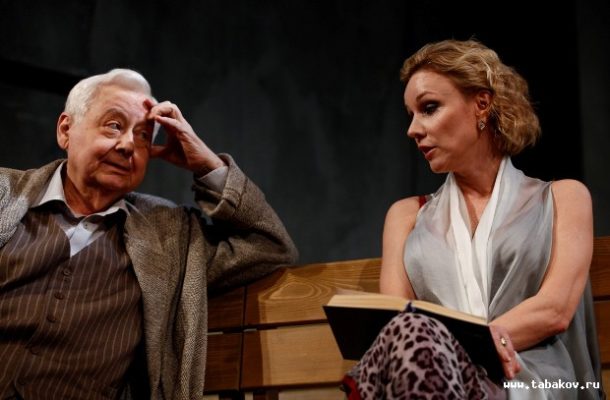
A scene from The Seagull, directed by Konstantin Bogomolov at the Oleg Tabakov Theatre, Moscow, 2014. Photo: The Oleg Tabakov Theatre.
The same benches. The same people sitting on them. Not next to each other. Not looking at each other. Not saying goodbye to each other. He is to depart leaving her behind; she is to depart to follow him. She hopes that “their souls will be merged in an attempt to create a single work of art,” and he tells her his Moscow address. He tries several epithets from his note-book, saying them aloud – about eyes, smile, and purity. How do they sound? Not flat by any chance? His female reader accepts them. Chekhov ends this scene with “a prolonged kiss,” but in Bogomolov’s production the actors do not even make eye contact. And still this short scene is possibly the most sensual of the performance – just several moments of what Boris Pasternak referred to as “eight lines on the properties of passion.”
“The sun hasn’t come near you yet, but you are smiling already,” Treplev says of Trigorin. The sun will go away (Trigorin will disappear in the wings), but this smile will remain. Standing alone on the stage Zarechnaya will go on smiling into the camera that will project a close-up of her smile onto the screen – a smile that is radiant, pure, shining and glowing with the anticipation of happiness. The stage, which recently has witnessed the recitation about “the men, the lions, the eagles,” now resonates with the song about “the yellow lion with the flame-like mane” and “the golden heavenly eagle.” On the backdrop, as if illustrating the lyrics, the words “the unforgettable star is bright” appear. Zarechnaya will disappear into the darkness of the wings, but her smile will linger, shining on and on upon the screen, reminiscent of the smile of the Cheshire Cat. Someone in the audience will break out laughing, but will promptly cut the laughter short, horrified. A single moment separates the most sensual scene of the production from its most horrifying one. In Le notti di Cabiria, Giulietta Masina’s heroine, having lost everything she had, at the very end of the movie smiled such a smile that the Vatican honored her with a special award – because there was hope in that smile, a ray of light piercing darkness. Zarechnaya-Kolpakova’s smile is so horrifying because with it comes the understanding that the interval between acts is actually an abyss that Nina cannot avoid. While members of the audience are “eating, drinking, walking about, wearing their coats” Zarechnaya is about to lose everything – herself, her baby and the man she loves. She has been dreaming of the golden city, as if it were something like those diamond studded skies, but instead fate has other things in store for her – first staying in the Slaviansky Bazaar hotel, and then traveling third class in the same car with peasants to Yelietz. “For the sake of being happy like that — of being a writer or an actress — I would put up with unfriendliness from my family, with poverty and disappointment…”, yet instead of romantic notions about overcoming hardships and stark adversities, woe comes stripped of romantic trappings. And suddenly, on that half-empty stage, emerges that which Zarechnaya had failed to act, but had succeeded in conjuring as a reality of her own life – that which is characterized by coldness, emptiness, and dread. Stained walls, dim glass — it is the lake now blanketed with brownish mire. It is not magic anymore; its spell will wear off completely during that intermission. “A seagull is flying over its own reflection. In calm water. It’s still like before a battle. Disaster is nigh…”
Emiliia Dementsova is a theatre critic and the script editor-in-chief at the cinema company Sputnik. She is a PhD candidate at the Lomonosov Moscow State University and is also a member of the International Association of Theatre Critics, the Russian Union of Journalists, and the Youth Council of the Theatre Union of Russia. Dementsova works as the author and anchor at a program titled Theatrical Circle on the radio outlet Journalist. She has acted as a cultural columnist for The Hollywood Reporter, Komsomolskaya Pravda, Theatron, Theatre World and WORLD 24, among others. She is a scholar of the Oxford Russia Fund. She received the International Press Club award called Challenge – XXI century for a series of theatre reviews she authored.
European Stages, vol. 8, no. 1 (Fall 2016)
Editorial Board:
Marvin Carlson, Senior Editor, Founder
Krystyna Illakowicz, Co-Editor
Dominika Laster, Co-Editor
Kalina Stefanova, Co-Editor
Editorial Staff:
Cory Tamler, Managing Editor
Mayurakshi Sen, Editorial Assistant
Advisory Board:
Joshua Abrams
Christopher Balme
Maria Delgado
Allen Kuharsky
Bryce Lease
Jennifer Parker-Starbuck
Magda Romańska
Laurence Senelick
Daniele Vianello
Phyllis Zatlin
Table of Contents:
- The 70th Avignon Festival: An Experiment In Living Together by Philippa Wehle
- The 2016 Berlin Theatertreffen: Is Half a Festival Better Than None? by Marvin Carlson
- Introduction au Kunstenfestivaldesarts de Bruxelles 2016 by Manuel García Martínez
- The Fidena Festival, 2016 by Roy Kift
- The Noorderzon Festival in Groningen by Manuel García Martínez
- Review of The Suicide by Steve Earnest
- Spain: Runaway Hits and Ephemeral Memorabilia by Maria M. Delgado
- The Seagull: An Idea for a Short Story by Emiliia Dementsova
- Billy Elliot The Musical at the Hungarian State Opera by James Wilson
- Chorus of Orphans: A Theatre Séance by Poland’s Teatr KTO, Kraków by Jacob Juntunen
- Theatre More Arresting than Ever: A Conversation with Dorota Masłowska by Krystyna Lipinska Illakowicz
Martin E. Segal Theatre Center:
Frank Hentschker, Executive Director
Marvin Carlson, Director of Publications
Rebecca Sheahan, Managing Director
©2016 by Martin E. Segal Theatre Center
The Graduate Center CUNY Graduate Center
365 Fifth Avenue
New York NY 10016



